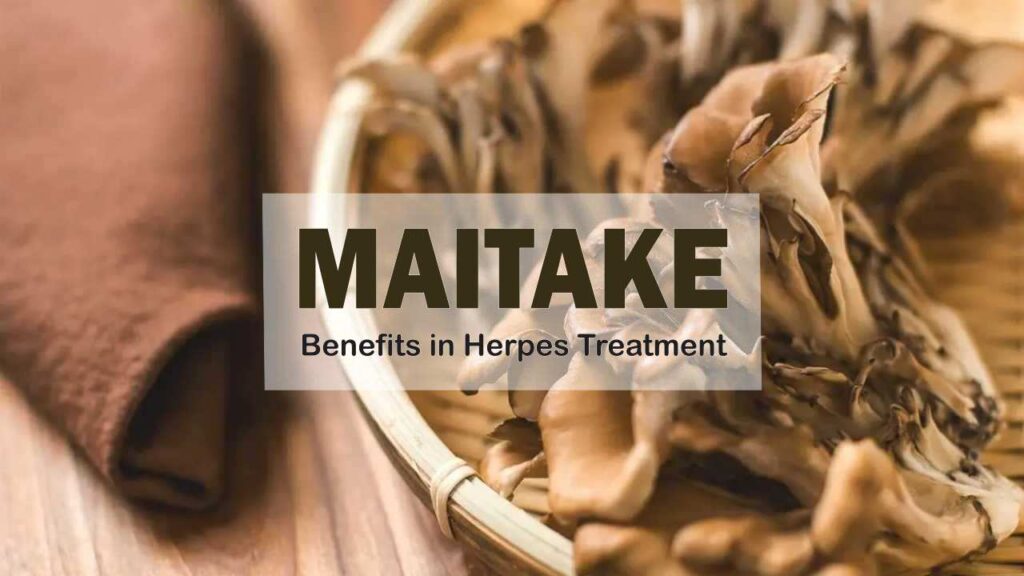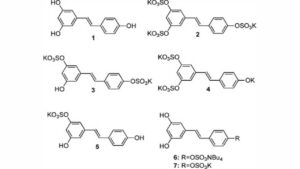Maitake (Grifola frondosa) is a mushroom that contains a variety of nutrients beneficial for herpes treatment. These nutrients can play an important role in promoting immune health and combating the herpes simplex virus HSV-1 and HSV-2. Learn how Maitake can assist in the treatment of herpes and cold sores.
Maitake and the Benefits in Herpes Treatment
Maitake (Grifola frondosa) is an edible mushroom native to East Asia, widely used in traditional Chinese and Japanese medicine. It is rich in essential nutrients and bioactive compounds, including beta-glucans, polysaccharides, ergosterol, and other immunomodulatory compounds. These substances have been the subject of scientific studies due to their beneficial effects on human health.

Antiviral Properties of Maitake
Recent research has suggested that Maitake possesses antiviral properties, which can be beneficial in herpes treatment. In vitro studies have demonstrated that Maitake extracts can inhibit the replication of the herpes simplex virus.
The polysaccharides present in the mushroom seem to play an important role in this antiviral effect, helping to suppress the virus’s ability to multiply and spread throughout the body.
Immunomodulatory Effect
One of the main characteristics of Maitake is its ability to modulate the immune system. The mushroom stimulates the production of immune cells such as Natural Killer (NK) cells, T lymphocytes, and cytokines, which are essential for fighting viral infections.
Additionally, Maitake may also help regulate the immune response, reducing excessive inflammation associated with herpes.
Reduction of Herpes Outbreaks
One of the challenges faced by people suffering from herpes is the frequent recurrence of lesions. Preliminary studies suggest that supplementation with Maitake can reduce the frequency of herpes recurrences. It is believed that the increased activity of the immune system and Maitake’s ability to inhibit viral replication contribute to this effect.
However, further research is needed to confirm these results and determine the appropriate dosages.
Combating Herpes Symptoms
In addition to helping prevent herpes recurrence, Maitake can also assist in combating symptoms associated with the infection. Anecdotal reports and some preliminary studies have indicated that Maitake can reduce the pain, itching, and inflammation of lesions caused by the herpes simplex virus. These benefits can be attributed to the immunomodulatory and anti-inflammatory properties of the mushroom.
Key Nutrients in Maitake Important for Herpes Treatment
Here are some of the key nutrients found in Maitake:
Beta-glucans
Beta-glucans are a type of soluble fiber found in the cell walls of mushrooms, including Maitake. They have immunomodulatory properties, meaning they can help regulate the body’s immune response.
Beta-glucans can stimulate the activity of Natural Killer (NK) cells and T lymphocytes, which play a crucial role in antiviral defense. Additionally, they can enhance the production of cytokines, signaling molecules involved in the immune response.
Polysaccharides
Maitake contains a variety of polysaccharides, such as grifolanin and D-fraction, known for their immunomodulatory properties. These polysaccharides have been associated with immune system activation and inhibition of herpes viral replication. They can also help regulate the inflammatory response, reducing inflammation caused by herpes.
Ergosterol
Maitake is a natural source of ergosterol, a compound that can be converted into vitamin D when exposed to sunlight or other sources of ultraviolet radiation. Vitamin D plays a crucial role in immune function and overall health.
Studies suggest that vitamin D deficiency may be associated with an increased risk of viral infections, including herpes. Therefore, the presence of ergosterol in Maitake may contribute to improved immune function and help combat herpes.
Antioxidants
Maitake contains antioxidants such as vitamin C and phenolic compounds, which can help reduce oxidative stress in the body. Oxidative stress is a process that occurs when there is an imbalance between the production of free radicals and the body’s ability to neutralize them.
Oxidative stress can lead to inflammation and cellular damage, and it may be involved in the progression of herpes. Therefore, consuming antioxidant-rich foods like Maitake can help reduce the severity and symptoms of herpes.
How to Incorporate Maitake into a Herpes Treatment Diet
It’s important to note that research on the specific nutrients in Maitake and their effect on herpes treatment is still in its early stages.
When incorporating Maitake into a diet for herpes treatment, it’s important to consider different forms of consumption and preparation to make the most of its benefits. Here are some suggestions on how to include Maitake in your diet:
Fresh Maitake consumption
Look for fresh Maitake mushrooms at supermarkets or natural food stores. You can incorporate them into various culinary preparations, such as sautés, stir-fries, soups, or add them to rice-based dishes, pastas, or vegetables.
Maitake Supplements
If you can’t find fresh Maitake, you may consider using Maitake supplements available on the market. They are usually available in capsule or powder form.
Maitake Tea
Prepare Maitake tea to enjoy its therapeutic properties. For this, you can use dried Maitake. Boil water and add thin slices of dried Maitake. Let it steep for about 10 to 15 minutes, then strain and drink the tea. You can consume it hot or cold.
Maitake Powder
Maitake is also available in powder form. You can add Maitake powder to smoothies, juices, yogurts, or recipes for healthy bread and cakes to enjoy its nutritional benefits.
Maitake Recipes
Try specific recipes that highlight the flavor and benefits of Maitake. For example, you can make a mushroom sauté by combining Maitake with other types of mushrooms and vegetables of your choice. You can also prepare a mushroom soup with Maitake, or even grill Maitake slices with a little olive oil and seasonings to create a tasty option.
It’s important to remember that Maitake should be used as a complementary therapy to conventional medical treatment for herpes.




